
Bremen, officially the Free Hanseatic City of Bremen, is the smallest and least populous of Germany's 16 states. It is informally called Land Bremen, although the term is sometimes used in official contexts. The state consists of the city of Bremen and its seaport exclave, Bremerhaven, surrounded by the larger state of Lower Saxony in northern Germany.

The Federal Republic of Germany, as a federal state, consists of sixteen states. Berlin, Hamburg and Bremen are called Stadtstaaten ("city-states"), while the other thirteen states are called Flächenländer and include Bavaria, Saxony, and Thuringia which describe themselves as Freistaaten.
Primus inter pares is a Latin phrase meaning first among equals. It is typically used as an honorary title for someone who is formally equal to other members of their group but is accorded unofficial respect, traditionally owing to their seniority in office.

Uwe Karl Beckmeyer is a German politician of the Social Democratic Party of Germany (SPD) who served as a member of the German Bundestag from 2002 until 2017.

Hamburg was founded in the 9th century as a mission settlement to convert the Saxons. Since the Middle Ages, it has been an important trading center in Europe. The convenient location of the port and its independence as a city and state for centuries strengthened this position.
The government of Hamburg is divided into executive, legislative and judicial branches. Hamburg is a city-state and municipality, and thus its governance deals with several details of both state and local community politics. It takes place in two ranks – a citywide and state administration, and a local rank for the boroughs. The head of the city-state's government is the First Mayor and President of the Senate. A ministry is called Behörde (office) and a state minister is a Senator in Hamburg. The legislature is the state parliament, called Hamburgische Bürgerschaft, and the judicial branch is composed of the state supreme court and other courts. The seat of the government is Hamburg Rathaus. The President of the Hamburg Parliament is the highest official person of the Free and Hanseatic City of Hamburg. This is a traditional difference to the other German states. The president is not allowed to exert any occupation of the executive.

The Bremische Bürgerschaft is the legislative branch of the Free Hanseatic City of Bremen in Germany. The state parliament elects the members of the Senate (executive), exercises oversight of the executive, and passes legislation. It currently consists of 83 members from seven parties. The current majority is a coalition of the Social Democratic Party, Alliance '90/The Greens and The Left, supporting Mayor and Senate president Andreas Bovenschulte. The 68 delegates of the city of Bremen also form the Stadtbürgerschaft, while Bremerhaven has its own local parliament.
The Constitution of the Free and Hanseatic city of Hamburg is the basic governing document of the German city-state of Hamburg. It was approved on 6 June 1952. It is the fourth constitution that the state has had, consists of 76 articles, and has been amended 34 times.

The Hanseaten is a collective term for the hierarchy group consisting of elite individuals and families of prestigious rank who constituted the ruling class of the free imperial city of Hamburg, conjointly with the equal First Families of the free imperial cities of Bremen and Lübeck. The members of these First Families were the persons in possession of hereditary grand burghership of these cities, including the mayors, the senators, joint diplomats and the senior pastors. Hanseaten refers specifically to the ruling families of Hamburg, Lübeck and Bremen, but more broadly, this group is also referred to as patricians along with similar social groups elsewhere in continental Europe.
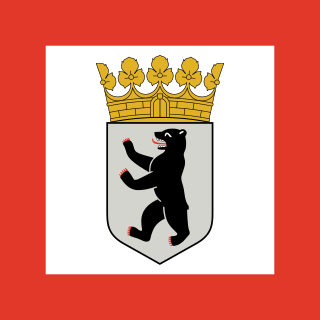
The Senate of Berlin is the executive body governing the city of Berlin, which at the same time is a state of Germany. According to the Constitution of Berlin the Senate consists of the Governing Mayor of Berlin and up to ten senators appointed by the governing mayor, two of whom are appointed (deputy) mayors. The Senate meets weekly at the Rotes Rathaus.
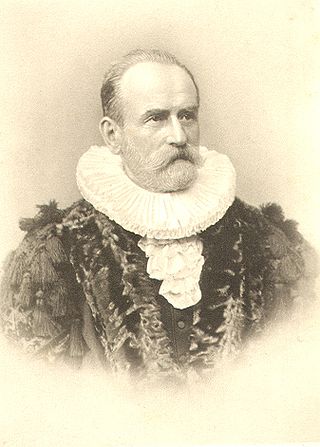
Johannes Georg Andreas Versmann was a German lawyer and politician. He was the first president of the new Bürgerschaft of Hamburg in 1859 and dominated the politics of the Hanseatic state as first or second mayor between 1887 and 1899.
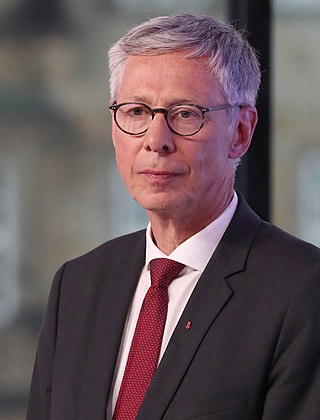
Carsten Günter Erich Sieling is a German politician of the Social Democratic Party (SPD) who served as the President of the Senate and Mayor of Bremen from 2015 to 2019. His successor is Andreas Bovenschulte.
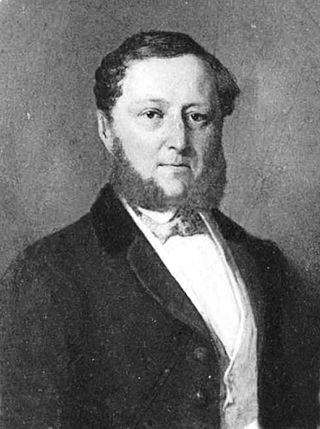
Carl Hermann Merck was one of the leading Hamburg statesmen of the 19th century, holding the office of Syndicus from 1847 until his death in 1880.
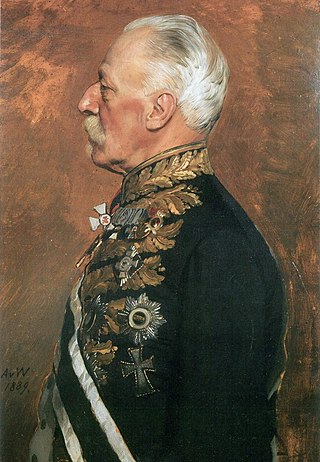
Daniel Christian Friedrich Krüger was a diplomat in the service of the city state of Lübeck and also jointly of the Hanseatic cities of Lübeck, Hamburg and Bremen. He was born in Lübeck on 22 September 1819 and died in Berlin on 17 January 1896.
The Minister president (Ministerpräsident) is the head of state and government in thirteen of Germany's sixteen states.
In the federal system of the Federal Republic of Germany, the state parliaments embody the legislative power in the sixteen states. In thirteen of the sixteen German states, the state parliament is known as the Landtag. In the states Free Hanseatic City of Bremen and Free and Hanseatic City of Hamburg, the state parliament is called Bürgerschaft (Citizenry), in Berlin it is called Abgeordnetenhaus.
Relations between the Free Cities of Bremen, Lübeck, and Hamburg and the United States date back to 1790s when Hamburg became the first of the republics to recognized the U.S. on June 17, 1790. Bremen followed suit on March 28, 1794. Diplomatic relations were formally established in October 1853 when the U.S. received Rudolph Schleiden as Minister Resident of the Hanseatic Legation in Washington, D.C. Relations ended in 1868 as the republics would join North German Confederation.

The Bovenschulte senate is the current state government of Bremen, sworn in on 15 August 2019 after Andreas Bovenschulte was elected as Mayor by the members of the Bürgerschaft of Bremen. It is the 25th Senate of Bremen.












